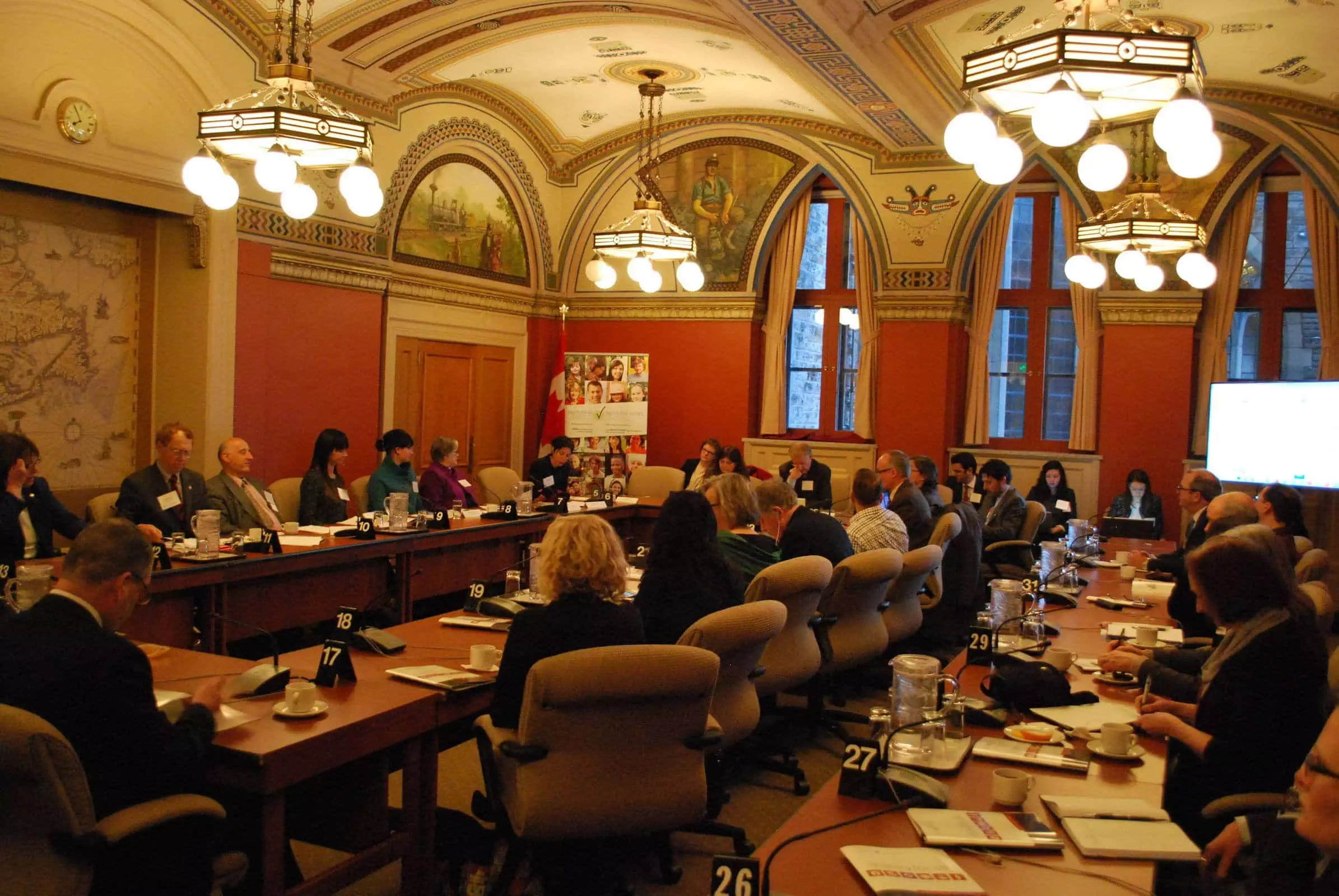It’s important that legislation for the new federal Poverty Reduction Strategy passes before the coming federal election so that ending poverty remains a priority in Canada no matter who gets elected.
That’s why many anti-poverty organizations were pleased with the recent inclusion of poverty legislation, with the governments tabling of the Budget Implementation Act (BIA).
This week, Dignity for All co-leads, Canada Without Poverty (CWP) and Citizens for Public Justice (CPJ), had the opportunity to present as witnesses to the House of Commons Standing Committee on Finance (FINA) regarding key poverty legislation. FINA’s study of the BIA gave way for a vigorous dialogue, and a chance to again reinforce our recommendations to improve the Poverty Reduction Act for the millions looking to this announcement.
In our open letter sent to the Honourable Minister Jean-Yves Duclos in February, sponsored by CWP, CPJ, and Campaign 2000 and signed by over 500 organizations and individuals, we outlined our position on the Poverty Reduction Act, making specific recommendations to strengthen the legislation. This Act – previously Bill C-87 – was tabled in Parliament and went to second reading, without any of the proposed amendments, to the Budget Implementation Act.
These recommendations, shared with the Finance Committee, are crucial if we want to get this legislation right:
- The Poverty Reduction Act should reflect Canada’s international human rights commitments, including the commitment that Canada has made in adopting the United Nations Sustainable Development Goals (SDGs). The targets and timelines identified currently in the legislation reflect the minimum goals set out in the SDGs, to reduce poverty rates by 20% by 2020 and by 50% by 2030. ESDC is using the 2015 Market Basket Measure rates as a starting point for these targets. However, the first SDG goal to which Canada has committed is no poverty. We recommend that the legislation be amended to reflect this as the ultimate goal with a much more ambitious timeline. Otherwise, we are failing to honour our international commitments and are implicitly claiming that it is acceptable to leave behind those remaining in poverty once the minimum goals are achieved.We also recommend that the legislation be amended to affirm economic and social rights as ratified by Canada in international human rights laws.
- In addition, the legislation recognizes the new Official Poverty Line as the Market Basket Measure (MBM0. While the legislation indicates that the MBM be subject to regular review, we recommend that review takes place no longer than every 3 years. It should also include public input, to ensure that the costing of the items identified as part of the “basket of necessities” reflects the actual costs experienced by low-income households and that the basket includes an adequate and appropriate range of costs. The current MBM base has not been updated since 2011, with a slight adjustment in 2012, though it is currently under review. That means that the costs being calculated now, for example, the cost of shelter, are vastly underestimated for some communities. Given that the MBM could now be used to establish eligibility and access to needed programs and benefits for low-income people, regular and public reviews are essential. The legislation should also recognize that no one measure of low-income or costs captures the reality of poverty, so a range of publicly available data sets should be included in assessing progress in achieving targets.
- Further, the new National Advisory Council on Poverty is being established to advise and report to the Minister and engage with the public in reviewing the progress of federal poverty reduction strategy. For this council to be effective, it must be independent, adequately resourced, and given authority to make recommendations and require remedial action for compliance with economic and social rights. There must be a transparent process for appointment of council members, including establishing criteria of qualifications, such as expertise focused on poverty eradication, people with lived experience of poverty, and regional representation. We recommend that Section 11, which authorizes the dissolution of the council once poverty has been reduced by 50% of 2015 levels, be removed or amended to ensure an ongoing mandate for the Council to oversee a goal of sustained poverty eradication.
- In addition to this legislation, we hope to see the federal government work in partnership with Indigenous governments to co-develop initiatives to ensure accountability and implementation of remedies for the distinctive barriers faced by First Nations, Métis, and Inuit persons living in poverty.
In addition to speaking as witnesses, Dignity for All submitted a brief outlining our recommendations, which included the full open letter and list of signatories.
We hope that bringing these recommendations forward and indicating the broad support we’ve received from across the country that the legislation and the strategy will be strengthened. We hope, as well, that poverty eradication remains a priority issue as we move toward a federal election in October.
Dignity for All before the standing committee on Finance (audio only):
Michèle Biss, Policy Director and Human Rights Lawyer at Canada Without Poverty:
Leilani Farha, Executive Director at Canada Without Poverty and United Nations Special Rapporteur on the Right to Housing:
Darlene O’Leary, Socio-Economic Policy Analyst at Citizens for Public Justice:

